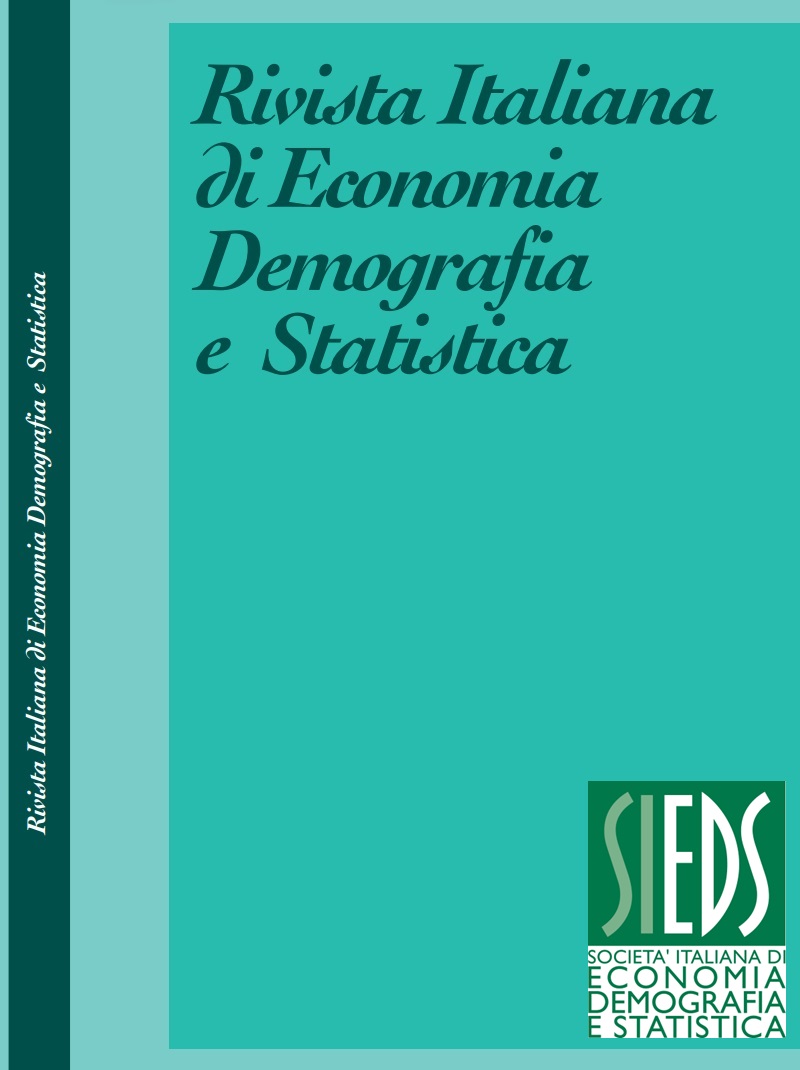A Quantitative Analysis of the Relationships between the Sustainable Development Goals
DOI:
https://doi.org/10.71014/sieds.v79i2.382Keywords:
Sustainable development goals, health and environment, dependence, copula funtionsAbstract
The 2030 Agenda for Sustainable Development has the seventeen Sustainable Development Goals (SDGs) at its heart and describes the path to ensure well-being, reduce inequality, encourage economic growth, and preserve the environment. Goals and targets are interconnected by construction. A standard approach to quantify synergies and trade-offs relies on the computation of positive and negative correlation coefficients between the indicators. In this work, we propose a method based on copulas to analyze SDGs interactions, offering a practical and innovative solution. Copulas allow studying more specific types of dependence beyond the linear association described by the correlation coefficients. We illustrate the practical application of this approach by analyzing the interactions between the goals' targets related to health and well-being (Goal 3) and those related to biodiversity (Goals 6,13,14,15).
References
ALLEN C., METTERNICHT G., WIEDMANN T. 2019. Prioritising SDG targets: Assessing baselines, gaps and interlinkages, Sustainability Science, Vol. 14, pp. 421-438. DOI: https://doi.org/10.1007/s11625-018-0596-8
BOAR A., BASTIDA R., MARIMON F. 2020. A systematic literature review. Relationships between the sharing economy, sustainability and sustainable development goals, Sustainability, Vol. 12, No. 17, pp. 1-14. DOI: https://doi.org/10.3390/su12176744
BLONDEL V. D., GUILLAUME J. L., LAMBIOTTE R., LEFEBVRE E. 2008. Fast unfolding of communities in large networks, Journal of statistical mechanics: theory and experiment, Vol. 2008, No. 10, pp. 1-12. DOI: https://doi.org/10.1088/1742-5468/2008/10/P10008
EHRENSPERGER A., DE BREMOND A., PROVIOLI I., MESSERLI P. 2019. Land system science and the 2030 agenda: exploring knowledge that supports sustainability transformation, Current Opinion in Environmental Sustainability, Vol. 38, pp. 68-76. DOI: https://doi.org/10.1016/j.cosust.2019.04.006
GRIGGS D. J., SMITH M. S., ROCKSTRÖM J., ÖHMAN M. C., GAFFNEY, O., GLASER G., KANIE N., NOBLE I., STEFFEN W., SHYAMSUNDAR P. 2014. An integrated framework for sustainable development goals, Ecology and society, Vol. 19, No. 4, pp. 1-24. DOI: https://doi.org/10.5751/ES-07082-190449
GRIGGS D. J., NILSSON M., STEVANCE A., MCCOLLUM D. 2017. A guide to SDG interactions: from science to implementation. International Council for Science, Paris.
JOE H. 1997. Multivariate models and multivariate dependence concepts. CRC DOI: https://doi.org/10.1201/b13150
press.
KOSTETCKAIA M., HAMENTNER M. 2022. How sustainable development goals interlinkages influence European Union countries’ progress towards the 2030 agenda, Sustainable Development, Vol. 30, No. 5, pp. 916-926. DOI: https://doi.org/10.1002/sd.2290
KROLL C., WARCHOLD A., PRADHAN P. 2019. Sustainable Development Goals (SDGs): Are we successful in turning trade-offs into synergies? Palgrave Communications, Vol. 5, No. 1, pp. 1-11. DOI: https://doi.org/10.1057/s41599-019-0335-5
LE BLANC D. 2015. Towards integration at last? The sustainable development goals as a network of targets, Sustainable Development, Vol. 23, pp. 176–187. DOI: https://doi.org/10.1002/sd.1582
LUSSEAU D., MANCINI F. 2019. Income-based variation in Sustainable Development Goal interaction networks, Nature Sustainability, Vol. 2, No. 3, pp. 242-247. DOI: https://doi.org/10.1038/s41893-019-0231-4
NELSEN R. B. 2013. An introduction to copulas. Springer.
NILSSON M, GRIGGS D, VISBECK M, RINGLER C. 2017. A framework for understanding sustainable development goal interactions. In GRIGGS D. J., NILSSON M., STEVANCE A., MCCOLLUM D. (Eds) A Guide to SDG Interactions: From Science to Implementation, International Council for Science: Paris, pp. 18-31. DOI: https://doi.org/10.24948/2017.01.01
PHAM-TRUFFERT M., METZ F., FISHER M., RUEFF H., MESSERLI P. 2020. Interactions among Sustainable Development Goals: Knowledge for identifying multipliers and virtuous cycles, Sustainable development, Vol. 28, No. 5, pp. 1236-1250. DOI: https://doi.org/10.1002/sd.2073
REDCLIFT M. 1991. The multiple dimensions of sustainable development. Geography, Vol. 76, No. 1, pp. 36-42. DOI: https://doi.org/10.1080/20436564.1991.12452296
SKLAR A. 1959. Fonctions de Répartition à n Dimensions et Leurs Marges, Annales de l’Institut Statistique de l’Université de Paris, Vol. 8, No. 3, pp. 229-231.
UNITED NATIONS. 2015. Transforming our world: the 2030 Agenda for Sustainable Development. United Nations: New York, NY, USA.
ZHAO M., MENG Z., XU B., YU D., WU S., LI R. 2023. Prior goal setting of SDGs based on the interaction correlation, Frontiers in Sustainability, Vol. 4, pp. 1-8. DOI: https://doi.org/10.3389/frsus.2023.1214615
Downloads
Published
Issue
Section
License
Copyright (c) 2025 Viviana Amati, Marta Nai Ruscone

This work is licensed under a Creative Commons Attribution 4.0 International License.



